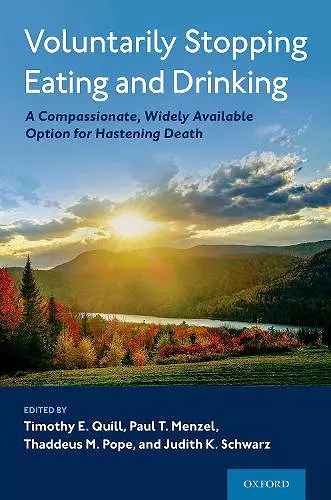Voluntarily Stopping Eating and Drinking
A Compassionate, Widely-Available Option for Hastening Death
Timothy E Quill editor Paul T Menzel editor Thaddeus Pope editor Judith K Schwarz editor
Format:Hardback
Publisher:Oxford University Press Inc
Published:12th Oct '21
Currently unavailable, and unfortunately no date known when it will be back

In the 21st century, people in the developed world are living longer. They hope they will have a healthy longer life and then die relatively quickly and peacefully. But frequently that does not happen. While people are living healthy a little longer, they tend to live sick for a lot longer. And at the end of being sick before dying, they and their families are frequently faced with daunting decisions about whether to continue life prolonging medical treatments or whether to find meaningful and forthright ways to die more easily and quickly. In this context, some people are searching for more and better options to hasten death. They may be experiencing unacceptable suffering in the present or may fear it in the near future. But they do not know the full range of options legally available to them. Voluntary stopping eating and drinking (VSED), though relatively unknown and poorly understood, is a widely available option for hastening death. VSED is legally permitted in places where medical assistance in dying (MAID) is not. And unlike U.S. jurisdictions where MAID is legally permitted, VSED is not limited to terminal illness or to those with current decision-making capacity. VSED is a compassionate option that respects patient choice. Despite its strongly misleading image of starvation, death by VSED is typically peaceful and meaningful when accompanied by adequate clinician and/or caregiver support. Moreover, the practice is not limited to avoiding unbearable suffering, but may also be used by those who are determined to avoid living with unacceptable deterioration such as severe dementia. But VSED is "not for everyone." This volume provides a realistic, appropriately critical, yet supportive assessment of the practice. Eight illustrative, previously unpublished real cases are included, receiving pragmatic analysis in each chapter. The volume's integrated, multi-professional, multi-disciplinary character makes it useful for a wide range of readers: patients considering present or future end-of-life options and their families, clinicians of all kinds, ethicists, lawyers, and institutional administrators. Appendices include recommended elements of an advance directive for stopping eating and drinking in one's future if and when decision making capacity is lost, and what to record as cause of death on the death certificates of those who hasten death by VSED.
This book is of high quality and useful in areas of the country where VSED is not common or where demand is increasing. While other books on this topic have been published, this one is most up to date and exhaustive in describing the ethical, legal, and practical considerations. * Leah D Ward, Doody *
This is an extremely well-organized, practical guide to the available options for self-determination with respect to experiencing a peaceful death. * E.R. Paterson, CHOICE Connect, Vol. 59 No. 8 *
This book is an essential resource for those exploring their options for palliative care. It provides authoritative advice and wisdom about whether and how to voluntarily stop eating and drinking, a path that that may be the best choice for some who are approaching the end of their lives. * Robert Truog, Director, Harvard Center for Bioethics *
Much attention has been directed to Medical Assistance in Dying (MAiD) as a means of hastening death for persons with serious and debilitating medical conditions, yet other methods such as Voluntarily Stopping Eating and Drinking (VSED) have flown under the radar. This volume is an important and timely remedy for that neglect.Many who do not qualify for MAiD or find it unacceptable may wish to consider VSED as an alternative means of hastening their death. VSED also raises a number of important clinical ethical and legal issues, especially when stipulated through an advance directive. These issues are thoroughly explored in this excellent volume. For anyone interested in end-of-life options, this is a must read. * Wayne Sumner, University Professor Emeritus, University of Toronto *
ISBN: 9780190080730
Dimensions: 239mm x 160mm x 25mm
Weight: 594g
308 pages